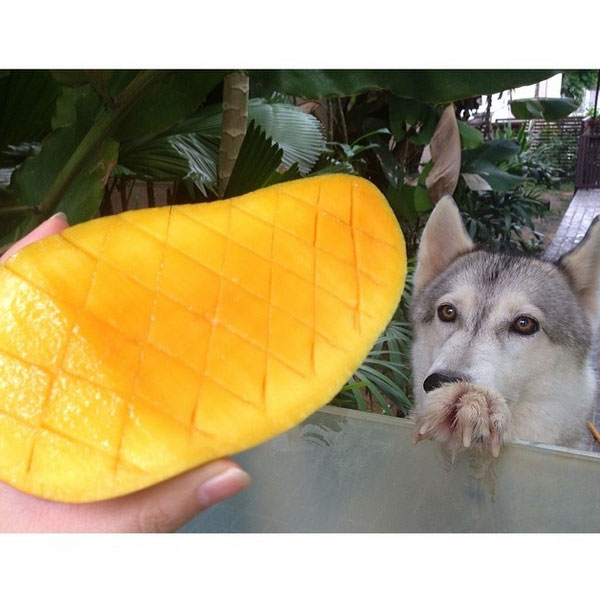Here at Dogster, we are constantly pondering whether the things we eat and enjoy are fit to share with our dogs and puppy pals. It occurred to us that while we recently offered a rundown of fruits, along with potential benefits and drawbacks to dogs, they were, for the most part, very common fruits. So what exotic fruits can dogs eat? Can dogs eat kiwis, dragon fruit and guava? We find out:
1. Can dogs eat acai berries?
Properly spelled “Açaí,” these tropical berries have been the rage among health-food aficionados for the better part of the last decade. While the ASPCA does not consider Acai berries to present any risk of toxicity for dogs, try not to give your dog an entire bowl of them. Acai contains theobromine, the primary cause of chocolate poisoning in dogs.
2. Can dogs eat blood orange?
As a member of the citrus family, the blood orange tree itself — including the leaves, stems, and other parts of the plant — contains citrus oils. Contact with these oils can cause skin allergies and irritation. As for the fruit’s fleshy interior, stick to a wedge or half a wedge as an occasional treat. The worst you can expect from a blood orange’s citric acid content is a bit of stomach upset.
3. Can dogs eat dragon fruit?
There are several varieties of dragon fruit, a member of the cactus family. The kind of dragon fruit you’re most likely to encounter at a market specializing in exotic or tropical fruits is the white-fleshed pitahaya. The popular name of “dragon fruit” refers to the rubbery, spiky petals that decorate the outside husk of the fruit. Cutting away the outer shell, dragon fruit pulp is safe for dogs in small amounts.
4. Can dogs eat fig?
There’s very little I like more than a ripe fig, plucked right off the tree, but you should exercise caution where your dog is concerned. A fig tree’s white, milky sap, present especially in the leaves and all parts of the fruit, contains an enzyme called ficin. The ficin in fresh fig sap can spur allergic skin reactions in humans, but is also known to cause similar rashes, irritation, and itching when consumed by dogs, so unless they’re dried, figs are best avoided.
5. Can dogs guava?
Apple guava, the most common variety of guava sold in markets, isn’t known to have any adverse effects on dogs. All the same, even safe fruits eaten in excess can upset a dog’s normal digestion, causing vomiting, diarrhea, and cramping as a result.
6. Can dogs eat kiwi fruit?
Kiwi is another fruit that I completely adore, but even I made the mistake, the first time I had one, of not completely removing the fuzzy, bristly peel. I ended up pulling the tiny quills from my tongue and lips for the rest of that day. Your dog runs the same risk with an unpeeled kiwi. As with any naturally sweet and juicy fruit, too much kiwi can have adverse effects on her digestive tract. Peeled and dried kiwi fruit should present no problems as an occasional treat.
7. Can dogs eat kumquat?
Kumquats are one of the rare branches of the citrus family whose skin is as edible for humans as its pulp. In a concentrated form, citrus oil derived from the rind of these fruits can irritate a dog’s skin on the outside and the liver on the inside, so it’s always recommended to peel kumquats and other citrus fruits if you are determined to offer your dog a taste.
8. Can dogs eat passion fruit?
While the blue and the running pop varieties of passion flower are considered toxic to both humans and pets due to their cyanide content, it’s extremely unlikely that the passion fruits produced by these varieties would find their way into your local market. The golden and purple varieties of passion fruit are the kinds you are most likely to encounter, and of these, purple is the least likely to cause your dog any immediate stomach upset.
9. Can dogs eat persimmon?
While persimmons may not contain many seeds, any that are ingested can irritate and inflame a dog’s small intestine. Add to this that the ripe persimmon is high in natural sugars, and even a little bit might cause digestive upset. On the other hand, if your dog is constipated, the high dietary fiber of persimmons, in small amounts, may help move things along.
10. Can dogs eat pineapple?
As long as the rough, spiky outer husk of the pineapple is removed, a chunk of pineapple here and there is great for dogs. Avoid feeding your dogs canned pineapples, though. Aside from the intense sugar content in the heavy syrup, canned pineapples are soaked in preservatives and additives that your dog doesn’t need.
11. Can dogs eat pomegranate?
Like passion fruit, pomegranate is an exotic fruit whose interior consists largely of seeds. To avoid intestinal blockages from these indigestible seeds, you should mash up the seedy pulp before giving a spoonful to your dog.
Which tropical fruit is your favorite?
Whatever benefits that your dog may derive from eating a piece of tropical or exotic fruit are likely to be found in her usual standard dog food. Here, the nutrients are portioned to serve your dog’s needs. A bit of strange fruit now and then, particularly if you find them dried or dehydrated, can be a nice treat on occasion. Too much of any new food is likely to cause digestive upset, so when you get your fruit of the month delivered, proceed with caution and moderation when sharing the bounty of exotic climes with your dogs!
Thumbnail: Photography by Shutterstock.
Learn more about what dogs can safely eat and drink on Dogster.com:
- Can Dogs Safely Eat Corned Beef and Cabbage?
- 3 Reasons Dogs Should Never Drink Alcohol
- Can Dogs Eat Potatoes Safely? What About Sweet Potatoes?
- Can Dogs Eat Granola Bars Safely?
- Can Dogs Eat Popcorn Safely?
- What Fruits Can Dogs Eat?
- Can Dogs Eat Cheese Safely? How About Other Dairy Products?
- Can Dogs Eat Nuts? Which Kinds Are Safe?
- Why Do Dogs Eat Hazardous Things, and What Can We Do About It?
The post What Exotic Fruits Can Dogs Eat? appeared first on Dogster.






No comments:
Post a Comment